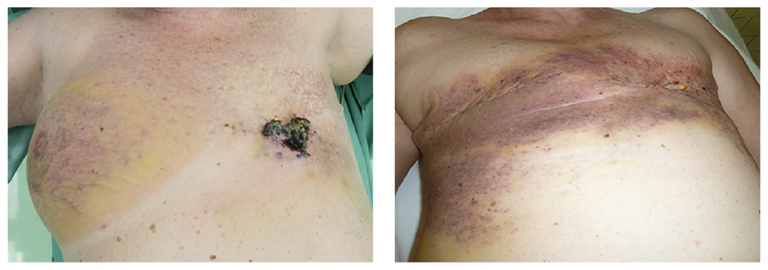Understanding the Cancer that affects 13% of Females
There are certain chances that you might know someone who has breast cancer as study has shown that 13% of females will at one point in their lives suffer from breast cancer and do not forget that women are more than men on the planet, over 50% but before you start to look at the opposite sex differently, let me give you this for free that even men can have breast cancer.
First, cancer isn't one thing and breast cancer isn't one thing but it can be referred to as breast cancer if the growth originates from the mammary tissue which is also known as the breast. Breast cancers are most common in the milk duct and it is known as Ductal carcinomas or they can also be in the Lobules known as Lobular Carcinomas. Because you start to think of breast cancer being localized in the breast, there are other types of breast cancers that can occur elsewhere in the body such as Angiosarcoma which affects the blood and lymph vessels but when it occurs in the tissues of breast, it is known as breast cancer.
Talking about breast cancer and localization, people can have breast cancers even when it is not in the breast as some people are born with mammary tissues in other parts of the body outside the breast in the case of ectopic breast tissues or supernumerary breast tissues and they can develop breast cancers. The armpit is the most common place for ectopic breast cancer as the tissues can extend there but they can also occur in other places like the groin and thighs.
Diagnosing breast cancer can take a while as the first nodules can be very small but then people can go for a checkup if there is a lump in the breast or armpit, or if there is a change in the size of breast, rough skin on the breasts, change in position of nipple, nipple licking fluid when they shouldn't. When a person is in the hospital, a mammogram and an ultrasound can be done. If anything is found, a biopsy is done and if the biopsy finds any cancerous cell, how far it has spread is looked into (known as staging).
There are so many of your habits that can cause cancer cancel that because that is not true. There is nothing at least for now that can cause cancer, there are only risk factors and certain things that can increase the risk factors. The first factor that can increase the risk factor of being diagnosed of breast cancer is being female, although it can happen to any sex but being female is the first risk factor. As we age, especially once a person is above 50 years there s a high risk of having breast cancer. Other risk factors includes family history, menstruating before the age of 12, and being overweight after menopause.
When breast cancer cells begin to grow,estrogen and progesterone causes them to multiply out of control. Another growth factor for breast cancer is the increased protein Human Epidermal Growth Factor Receptors 2 (HER 2). In the hospital, using antibodies to neutralize the protein HER 2 in the body, and they can also use targeted therapy. In the case of triple negative breast cancers, they can be very aggressive. This cancer has a lot to do with genetics with two genes BRCA1 and BRCA2 mutation being involved but these cancer can be stopped by adding methyl group to specific specific spot on the DNA telling the cells not to read those part of the DNA.
Understanding breast cancer, its risk factors, and the importance of early diagnosis is crucial in the fight against this disease. While risk factors like gender, age, and genetics play significant roles, awareness and regular check-ups can make a difference. If you notice any unusual changes in your breast or armpit area, consult a healthcare provider promptly. Early detection and treatment are key to improving outcomes for those affected by breast cancer.
Reference
https://www.cancer.gov/about-cancer/causes-prevention/genetics/brca-fact-sheet
https://www.cancerresearchuk.org/about-cancer/breast-cancer/types/invasive-breast-cancer
https://www.cancer.gov/types/breast/breast-hormone-therapy-fact-sheet
https://www.mayoclinic.org/diseases-conditions/breast-cancer/in-depth/breast-cancer/art-20045654
https://www.sciencedirect.com/topics/medicine-and-dentistry/epidermal-growth-factor-receptor-2
https://www.cancer.gov/types/breast/hp/breast-ovarian-genetics-pdq
https://www.cdc.gov/genomics/disease/epigenetics.html
https://genomemedicine.biomedcentral.com/articles/10.1186/s13073-023-01262-8
https://www.who.int/news-room/fact-sheets/detail/breast-cancer
https://www.ncbi.nlm.nih.gov/books/NBK482286/
https://www.ncbi.nlm.nih.gov/pmc/articles/PMC6545400/
https://www.cancerresearchuk.org/about-cancer/breast-cancer/symptoms
https://www.cancer.gov/types/breast/breast-hormone-therapy-fact-sheet
https://www.cancerresearchuk.org/about-cancer/breast-cancer/treatment/chemotherapy
https://www.frontiersin.org/articles/10.3389/fmolb.2022.836417/full
https://www.ncbi.nlm.nih.gov/pmc/articles/PMC9227697/
https://www.cancerresearchuk.org/about-cancer/breast-cancer/risks-causes/risk-factors

Thanks for your contribution to the STEMsocial community. Feel free to join us on discord to get to know the rest of us!
Please consider delegating to the @stemsocial account (85% of the curation rewards are returned).
Thanks for including @stemsocial as a beneficiary, which gives you stronger support.
Congratulations @busted1! You have completed the following achievement on the Hive blockchain And have been rewarded with New badge(s)
Your next target is to reach 70000 upvotes.
You can view your badges on your board and compare yourself to others in the Ranking
If you no longer want to receive notifications, reply to this comment with the word
STOP